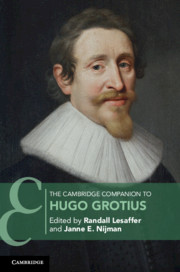Book contents
- The Cambridge Companion to Hugo Grotius
- Cambridge Companions to Law
- The Cambridge Companion to Hugo Grotius
- Copyright page
- Contents
- Contributors
- Preface
- Chronology
- Abbreviations and Short Titles of Works by Grotius
- Editions and Translations of Grotius’ Work
- Introduction
- Part I Grotius in Context
- Part II Concepts
- 4 Virtue
- 5 Trust (Fides)
- 6 Natural Law as True Law
- 7 Sociability
- 8 Sovereignty
- 9 Church and State
- 10 Predestination
- 11 Rights (I)
- 12 Rights (II)
- 13 Property, Trade and Empire
- Part III Grotius as a Man of Letters, Theologian and Political Writer
- Part IV Grotius as a Legal Scholar
- Part V The Reception of Grotius
- Index
- References
9 - Church and State
from Part II - Concepts
Published online by Cambridge University Press: 03 September 2021
- The Cambridge Companion to Hugo Grotius
- Cambridge Companions to Law
- The Cambridge Companion to Hugo Grotius
- Copyright page
- Contents
- Contributors
- Preface
- Chronology
- Abbreviations and Short Titles of Works by Grotius
- Editions and Translations of Grotius’ Work
- Introduction
- Part I Grotius in Context
- Part II Concepts
- 4 Virtue
- 5 Trust (Fides)
- 6 Natural Law as True Law
- 7 Sociability
- 8 Sovereignty
- 9 Church and State
- 10 Predestination
- 11 Rights (I)
- 12 Rights (II)
- 13 Property, Trade and Empire
- Part III Grotius as a Man of Letters, Theologian and Political Writer
- Part IV Grotius as a Legal Scholar
- Part V The Reception of Grotius
- Index
- References
Summary
The present article examines Grotius’ views on the relationship between church and state. He composed most of the works dealing exclusively with this theme in the years before 1618, but his later work is discussed as well. The historical and intellectual background to Grotius’ views is examined, such as the Dutch religious troubles, toleration, Jewish history and Erastianism. This is followed by Grotius’ general views on church and state as expressed in his works and his views on specific aspects, such as lawgiving, the right of resistance by the church, synods, ecclesiastical hierarchy, divine and natural law. It is concluded that Grotius held that there is only one, indivisible sovereign government, and that this is civil government: all external acts in the public space are subject to the sovereign. Abuse of this absolute power is restricted by the fact that the sovereign has to render account to God. Grotius’ lifelong ideal was that of a state based on these principles, with a Christian public church, where toleration of religious differences was practised.
Keywords
- Type
- Chapter
- Information
- The Cambridge Companion to Hugo Grotius , pp. 198 - 220Publisher: Cambridge University PressPrint publication year: 2021



